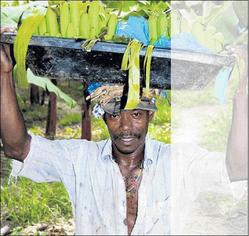
A farmer transports bananas out of the field at a small farm in Albion Mountain, St Mary. - File Photo
Jamaica's agriculture Minister, Dr Christopher Tufton, stopped short yesterday of announcing a formal withdrawal from the export banana business, saying that work for a new policy for the sector would begin at an October 14 workshop of industry players.
But Tufton left little doubt that a return by the island to the UK market was, at best, a very slim possibility, now that Jamaica Producers Group, which grew 90 per cent of export bananas, would no longer grow the fruit to sell abroad.
At the same time, Tufton promised a cushion to rural communities and workers hit by the fallout, using a $131.3-million support fund from the European Union (EU).
"... The development of an appropriate banana policy framework will start with a key issues and strategy options workshop on Tuesday ... October 14, with participants being drawn from a wide cross section of the industry," Tufton told legislators in the House of Representatives.
But he made it clear that any strategy would have to be informed by:
JP' strategic decision to leave the export industry;
The findings of a broad financial analysis of the industry;
The strong domestic market for bananas; and
Increasing erosion at the World Trade Organisation (WTO) of preferences enjoyed by African, Caribbean and Pacific countries, including Jamaica, in the EU market.
"We believe that we can use this event to not only expedite the development of an appropriate strategy for Jamaica's banana industry, but also to ensure that the use of the rural diversification funds in areas where banana production is no longer viable will indeed achieve the overall objective of sustainable development ...," Tufton told legislators.
The viability of producing bananas for export from Jamaica has been precariously perched in recent years in the face of a series of storms, since the start of the decade, that severely damaged farms.
Already forced by cheaper Latin American producers to cut acreage and consolidate its output to two farms in eastern Jamaica, JP, recovering from storms in 2007, had only just resumed significant exports last month before Tropical Storm Gustav destroyed its plantations. Indeed, a year ago, it had been coaxed into resume growing the fruit for export only by a government guarantee of its insurance premium,
The company now says that it will lease about 1,000 acres of farmland and use just under that amount to grow bananas and tubers for its snacks and agro-processing subsidiaries.
However, Tufton, from a broad strategic perspective, does not expect a withdrawal from export bananas - in 2006 the island exported just under 33,000 tonnes and earned US$20 million - to be particularly painful for the small and medium-scale farmers, who produced the 10 per cent of the bananas JP did not grow.
In that year, small farmers contributed only nine per cent of the export figure and medium farmers four per cent.
Low export volumes
"These very low export volumes for medium and small farmers is an indication that the larger percentage of of fruit produced on these farms is being sold on the domestic market," Tufton said.
Moreover, an analysis of the industry last year showed that the large farms, which were primarily engaged in exports, sold up to 20 per cent of their output in Jamaica.
"Then, it is very clear that the domestic market is the major market for banana production in Jamaica," the minister said.
Indeed, he argued, there was a largely unsatisfied domestic demand for banana for chips and other formss of consumption and the fruit often commanded a higher price here than abroad.
business@gleanerjm.com
Tufton's plan of action
Working closely with the Jamaica Producers Group Ltd to ensure that redundancy payment to displaced workers is expedited.
Establishment of a secretariat, using a model similar to the area development committees being developed by the Ministry's Sugar Transformation Unit, that will include representatives of RADA, the European Union Banana Support Programme, the unions, credit unions and other key stakeholders to:
a. Assess the needs and develop a profile of the displaced workers
b. Organise the workers and establish links with existing growers organisations and NGOs so that they are better positioned to benefit directly from the interventions of the European Union Banana Support Programme
c. Develop the most appropriate use of available EUBSP grant funds that can be used to support capacity building and the engagement of those displaced in alternative economic enterprises that are sustainable.
A meeting with banana industry stakeholders such as the Banana Export Company Ltd; the unions, Jamaica Producers Group, the All Island Banana Growers Association to discuss the present situation and the way forward
Meetings with both the displaced workers and the non-estate export farmers during the next week
The staging of a key issues and strategy options workshop on October 14, 2008 as the beginning of the development of a banana policy framework. This is in response to both the post- Gustav effects and the significant changes taking place in the inter-national banana market at this time.

